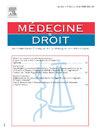Don du corps à la science
IF 0.1
Q4 MEDICINE, LEGAL
引用次数: 0
Abstract
In Nice, as in the other twenty-seven Body Donation Centers in France, the application of the 2022 decree on body donation (decree No. 2022-719 of April 27, 2022) has had a significant impact on its internal operations, in view of three major legislative changes: confirmation that donation and all related costs (transport, coffin, burial, serological samples where applicable) are free of charge, the choice of burial is left to donors, requiring the lifting of anonymity in the event of ashes being recovered, and the creation of a Scientific and Educational Ethics Committee which now monitors all research work and programs authorized in the structure receiving the deceased. Thanks to the annual activity report of the Centre des dons du corps (CDC) des Alpes Maritimes, it is possible to obtain a snapshot of its activity in terms of data relating to registrations and admissions carried out over the year 2023. Analysis of the information collected in the donation consent form has made it possible to extract donors’ preferences with regard to the fate of their body after completion of the anatomical work. The aim of this study was to measure the organizational and functional impact of the reform on the activities of the Nice body donor center, a few months after the publication of the implementing decree, and to raise the new ethical issues raised by this reform.
身体给科学的礼物
与法国其他二十七个遗体捐献中心一样,2022 年遗体捐献法令(2022 年 4 月 27 日第 2022-719 号法令)的实施对尼斯遗体捐献中心的内部运作产生了重大影响。2022年4月27日颁布的第2022-719号法令)对其内部运作产生了重大影响,因为该法令做出了三项重大修改:确认遗体捐献和所有相关费用(运输、棺木、安葬、血清样本等)均为免费;由捐献者自行选择安葬方式;要求在骨灰被寻回的情况下取消匿名;成立科学和教育伦理委员会,负责监督在接收逝者的机构内授权开展的所有研究工作和项目。通过滨海阿尔卑斯省捐献者中心(CDC)的年度活动报告,我们可以了解到该中心在 2023 年期间的活动情况,包括登记和接收的相关数据。通过对捐献同意书中收集的信息进行分析,可以了解捐献者对解剖工作完成后遗体去向的偏好。本研究的目的是在实施令公布几个月后,衡量改革对尼斯遗体捐献中心活动的组织和功能影响,并提出改革带来的新的伦理问题。
本文章由计算机程序翻译,如有差异,请以英文原文为准。
求助全文
约1分钟内获得全文
求助全文
来源期刊

Medecine & Droit
MEDICINE, LEGAL-
CiteScore
0.30
自引率
0.00%
发文量
27
期刊介绍:
The Scientific Committee of the journal Médecine et Droit includes professors of medicine, professors of law, magistrates, lawyers, court medical experts, and specialists in compensation for physical injury. Médecine et Droit provides: • rigorous and clear support for informative and educational matter • a tool for reflection and actualisation of knowledge • an essential link between doctors and lawyers. Médecine et Droit informs: • doctors on different aspects of law and regulations encountered in their profession • lawyers on the specific problems of the medical profession and important bio-ethical issues
 求助内容:
求助内容: 应助结果提醒方式:
应助结果提醒方式:


